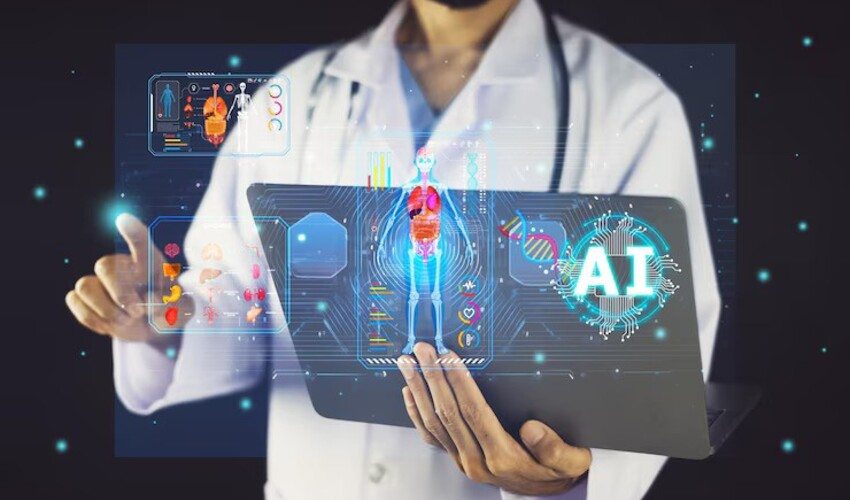The integration of Artificial Intelligence (AI) in healthcare is transforming the way medical experts diagnose, cure, and manage patient care. By relying on the capabilities of artificial intelligence, healthcare companies can improve patient results, organize workflows, and enhance the entire quality of care.
Introduction
The Significance of AI in Evolving Electronic Healthcare Records (EHRs)
Artificial intelligence is changing electronic health records (EHR) by allowing more intuitive data analysis and management. AI algorithms can examine huge data amounts of patient data, pinpointing patterns and insights that were difficult to identify in the past. This modernization permits healthcare companies to view in-depth patient histories rapidly. This facilitates enhanced clinical decision-making.
In addition, incorporating AI into EHR mechanisms improves data accuracy and decreases human mistakes. With the automation of retrieval processes and data entry, healthcare experts can concentrate more on patient care instead of administrative tasks. This enhances the entire service delivery.
Improving Workflow Efficiency Via Automation
AI-driven automation plays an important role in improving workflow efficiency within the settings of healthcare. With the automation of routine tasks like record updates, billing, and appointment scheduling, healthcare companies can decrease the time allocated to administrative duties. This permits staff to devote more time to allocate to patient-care interactions.
In addition, automation tools can organize communication between the departments. This guarantees that important patient information is shared punctually. This interconnection accelerates the workflow and reduces the risks associated with miscommunication. This generates a cohesive healthcare experience.
Data-Driven Insights Generating Enhanced Patient Outcomes
The incorporation of AI into EHR systems allows healthcare companies with data-driven insights. This leads to enhanced patient results. Through the analysis of patterns and trends in patient data, AI can assist clinicians in pinpointing possible health-related risks and interrupting earlier treatment procedures.
In addition to this, AI can help in customizing treatment plans based on customized patient data. This guarantees that the care is customized to meet unique patient requirements. This transformation towards customized healthcare medicine improves patient satisfaction. It also contributes to enhanced health results overall.
Resolving The Difficulties In AI HER Integration
Besides the advantages of AI EHR integration, numerous difficulties must be resolved to guarantee successful application. One of the major concerns is data security and privacy. As healthcare companies adopt AI technologies, they should prioritize protecting sensitive data from unauthorized access and breaches.
Another difficulty is the requirement for interoperability between the various EHR systems. This guarantees that AI tools can flawlessly integrate with current platforms if important for optimizing their effectiveness. Continuous support and training for healthcare experts are also important to assist them adapt to the latest technologies and workflows.
Future Trends in EHR and AI Systems
Shortly, AI and EHR systems promise even more innovative advancements. Emerging technologies like natural language processing and machine learning, are predicted to further improve the capabilities of EHR systems. This allows for patient communication and sophisticated data analysis.
In addition to this, as telehealth continues to expand, AI integration will play a main role in the management of virtual consultations and virtual patient monitoring. This evolution enhances access to care and facilitates continuous patient engagement. This ultimately leads to an increasingly patient-focused and responsive healthcare system.
Frequently Asked Questions (FAQs)
What is artificial intelligence?
Artificial Intelligence (AI) refers to the development of computer systems that can perform tasks that typically require human intelligence, such as:
· Learning
· Problem-solving
· Reasoning
· Perception
AI systems use algorithms and data to make decisions, predictions, or take actions. They can be applied to various industries, including healthcare, finance, transportation, and customer service.
What is meant by EHR?
An Electronic Health Record (EHR) is a digital version of a patient’s medical history, containing all the clinical data collected during patient encounters. EHRs are designed to provide a comprehensive and accurate picture of a patient’s health information, enabling healthcare providers to deliver high-quality care.
What is the biggest benefit of AI EHR integration?
The biggest benefit of AI EHR integration is Improved Patient Care Management. AI technologies can predict patient risks, tailor treatment plans, and monitor health conditions in real-time, ensuring patient care is individualized and optimized. This proactive approach enhances treatment effectiveness and patient satisfaction.

